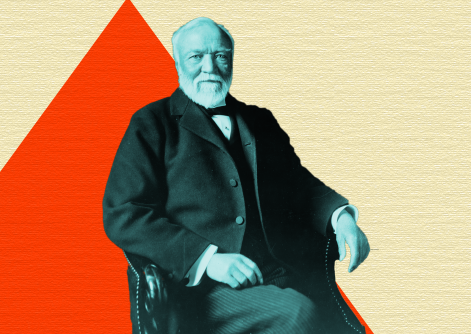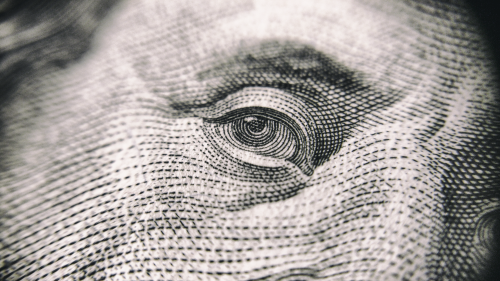They don’t make men like they used to. Today you can take three decades or more to become a man—a reasonably tough, self-reliant soul who takes some risks, engages in some productive activity, and devotes himself to something greater than his own pleasures.
Bill Daniels, the donor who started the Daniels Fund in Denver, was on a tighter schedule. He went from high school graduation in 1941 to fighter pilot training to a commission as a World War II Navy lieutenant who flew off the pitching decks of aircraft carriers at a time when radar was a novelty and GPS unheard of. Yet young men like Daniels flew from those decks at night, with the lights turned off to avoid detection.
Daniels didn’t earn a college degree, but he did earn the Air Medal, the Distinguished Flying Cross, and the Navy Cross—an award second only to the Congressional Medal of Honor—while serving in the 1942 invasion of North Africa and then in the Pacific theater. He downed 11 enemy planes, and while on the USS Intrepid, he had two kamikaze aircraft crash into the deck:
“I was in the ready room, two decks below flight deck,” he later recalled. “The ship was on fire, and one of my squad mates was trapped with his leg half blown off. I had to apply a tourniquet, cut off the rest of his leg, administer morphine, and carry him up two flights to the flight deck for help.”
Daniels ended up carrying other wounded comrades, too, and earning a Bronze Star. Five years after the close of World War II, he was recalled to the Navy for the Korean War. He had several missions overseas before returning stateside to serve as a flight instructor. His students included pilots who would later become the first members of the Navy’s Blue Angels, the famous flight demonstration team whose superlative flying still tests the limits of man and machine.
For the rest of his life, Daniels would honor veterans, especially those who worked for him. One Vietnam vet recalls the day he walked into his office and found a model of the Vietnam Memorial on his desk with a note from Daniels: “Thank you for your service.”
That meant a lot to the vet, Steve Halstedt, who later reflected
Having been ostracized by my peers when I came back from Vietnam, I realized that this was the first time anyone had ever said, “Thank you.”
Now that you have a sense of Bill Daniels the man and veteran fighter pilot, listen to what “professional” staff at a billion-dollar foundation created by such a man can do to trample his donor intent within two years of his death.
Unilaterally, without board knowledge or consent, the staff rejected a request from the Smithsonian’s National Air and Space Museum:
In 2002 the museum sought a grant to preserve World War II aircraft. The application was refused because, in the program officer’s words, it was against policy to give grants to preserve “instruments of war.” The museum wrote back, explaining it wanted to preserve many of the planes that Daniels flew during the war. The museum received a second rejection, stating that the fund’s official policy was not to support preserving objects that “kill people.”
The same liberal program officers banned all grants to the Boy Scouts because of the Scouts’ policy on homosexual members, even though the board had stated that the Daniels Fund was officially neutral on gays and the Scouts. “Bill loved the Boy Scouts,” recalls its current president, Linda Childears, lamenting this earlier era in the Fund’s history.
Can This Philanthropy Be Saved?
Now if you think a man like Bill Daniels deserves to have his donor intent respected, you would want something to happen at this point in our story, and it did.
In late 2003, the cavalry arrived in the form of the board and the relatively new president, Hank Brown, who had been a Republican Senator from Colorado and, like Daniels, served in naval aviation, including volunteering for service in Vietnam. These leaders sacked a third of the Fund's staff and instituted reforms, such as requiring that the board be informed of all grants rejected and of all grants made (previously, staff sometimes made grants up to $100,000 without board approval).
Of course, such simple decency and respect for Bill Daniels didn’t receive universal praise. For the full story, which I’ve drawn on here, read my Capital Research Center colleague Martin Morse Wooster’s masterful essay for Foundation Watch, which is a prelude to the upcoming fourth edition of his magisterial work, The Great Philanthropists and the Problem of ‘Donor Intent.’
But for now, here are a few highlights of the reaction from the liberal establishment:
● The New York Times had a fit, claiming Daniels should be “turning over in his grave.”
● The Denver Post sniffed, “The fund’s behavior appears more appropriate to a compliance-based widget factory than a charitable foundation.”
● The prominent Georgetown University philanthropy scholar Pablo Eisenberg objected, “This is sort of like a right-wing coup.”
Eisenberg is an appealing character, but I’d bet the mortgage he’s never complained about the countless left-wing coups that have caused billions of dollars from Henry Ford, the Pew family, David Packard, and many others to sail away from the intentions of the donors who endowed the philanthropies that bear their name.
In fact, it’s almost unheard of for a philanthropy to recover its donor intent the way the Daniels Fund has, although a handful of conservative philanthropies have managed to resist the powerful attractions of moving left. (Again, see Wooster’s definitive history.)
In the case of Daniels, there’s just no empirical justification for the claptrap that arose when the Fund corrected its course. Daniels was an avowed conservative. Even (gasp!) a Republican, who ran on the party line for governor of Colorado (he lost in the primary). He was pals with the Bush family and gave six-figure donations to the party’s coffers.
The best part of Wooster's tale, in my view, is the way that Bill Daniels blows out of the water every stereotype the Left creates about the rich. Admittedly, not every business magnate is as good a man as Daniels was, but he proves you can be that good and still rise from poverty to great wealth and generosity.
Humble Beginnings
Although he would later endow a billion-dollar foundation, Daniels had a humble origin in 1920 when he was born in Greeley, Colorado, the son of a father who sold insurance to farmers. When the Great Depression hit,
We lost our house and moved to Council Bluffs, Iowa, where my grandmother had a home with no mortgage. My brother and I had to scrounge around in the woods in the winter, gathering firewood. We couldn’t afford coal.
Daniels never made it to college, and thanks to the wild teenage ways common among those who become fighter pilots and win multiple medals, he needed some help molding his character. And so his parents scraped together enough money to let him attend the New Mexico Military Institute. Even then, he worked nights to contribute to his tuition.
After World War II, he set up a branch of the insurance business in Casper, Wyoming, but one night he saw his first television set and “began to think there had to be a way to get TV to little towns like Casper.” So he went into the cable TV business on the side, struggling to get credit because this new field sounded crazy to conventional businessmen.
He also innovated in programming, offering one of the first cable news shows. He was not a major investor himself, but his genius as a middleman allowed him to capitalize on the small stakes in cable systems he received as his commission for deals he brokered. While the fledgling industry grew, Wooster recounts,
Daniels acted both as someone with an endless source of suggestions and as someone who would be a constant source of encouragement to other entrepreneurs frustrated by bureaucracy or the strength of entrenched broadcasters.
Those broadcasters, like so many businesses, used the power of government regulations and licensing to keep down upstart competitors like Daniels. One of his colleagues later told a biographer that Daniels possessed
a trait that was rare in any industry, and he used it to great advantage to build his business. He genuinely wanted to see others succeed, even when they were competitors. Success for anyone in cable, he realized, ultimately meant success for all.
In fact, the success of cable, and the enormous increase in consumer choice and services that cable and its successor industries have created, were only possible because of a deregulatory policy known as “Open Skies,” which let other companies compete with AT&T’s monopoly on satellite services.
This act of capitalist competition dramatically lowered transmission fees and made cable networks possible. In less than a decade, Americans could enjoy such novelties as CNN, ESPN, and C-SPAN. By 1985, Daniels had helped to build all of the top six cable operators in the U.S., and eight of the top ten.
Daniels was not only generous to colleagues in the industry but also to his employees. They would tell numerous stories of his personal kindnesses and financial help. And when Daniels made a particularly big score selling one of his companies in 1994, he
made sure that $10 million went to 15 senior vice-presidents and department heads, while an additional $1 to $2 million would be divided between 105 less senior employees.
Nor did his charity end with money at the office. In winter, he went to poor neighborhoods and secretly left cash on people’s doorsteps, his biographer notes, adding that he also
worked in soup kitchens, and he handed out food to the indigent so that he could be reminded of all that he had and how little some people got by on. He encouraged everyone who worked for him to be charitable toward the needy.
While Daniels generously gave his own money away, he didn’t think highly of government-coerced redistribution of wealth, or the groups that advocate for it. As he told his foundation board:
Remember I am a conservative and want no money going to liberal causes. The only thing I have in common with liberals is my concern for the downtrodden.
He also eschewed “research of any kind,” probably for the reason his biographer gives: “he always gave to programs that actively worked to help people, not to programs that analyzed how to prevent problems.” Similarly, he forbade the Fund from giving to fine arts like symphonies, art, and opera.
I am just not into that. I am into helping people who need help, who are hungry, unclothed, in trouble.
The Danger of Credentials, Professionals, and Experts
So why did his foundation go astray soon after he died? Not so much from any intended plan to move left, but rather by looking to “experts to see what should be done,” explains Childears. The president who preceded Hank Brown “went to big foundations and hired people with expertise” in areas Daniels had wanted to fund, such as scholarships. The president also went for help to Harvard’s Hauser Center for Nonprofit Organizations.
After being innocently drawn to this world of credentialed, professional experts, the foundation ended up, for example, hiring a chief operating officer from the Rockefeller Foundation, an entity that requires an entire chapter in Wooster’s book to chronicle its betrayal of its donor. Expert begat professional begat credentialed program officer, and soon staffers were sneering at a museum’s effort to remember the men who (like Daniels) had flown dangerous missions to defend the freedom of self-righteous American leftists like themselves.
Read the whole story Wooster tells, which describes in detail the great habits the Daniels Fund now practices and also reminds us once again that a foundation’s board and staff should be filled with persons philosophically attuned to the donor, whether or not they have Ivy League credentials.
A New York Times reporter profiling Daniels in 1983 was a bit overwhelmed. She explained that "he’s a plain-spoken man with a Western twang, whose favorite adjective is 'helluva,'" and he "seems to have stepped out of a John Wayne movie.”
Yes indeed. He was a helluva donor. And a helluva man.
FOOTNOTE: For the story behind Open Skies, read the account of Christopher DeMuth, a regulatory scholar and my longtime leader at AEI. One reason that the Nixon Administration supported Open Skies, DeMuth explains, was its excitement “at the prospect of diverse local TV stations independent of the evil empire of ABC, CBS, and NBC.”






